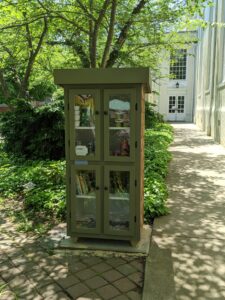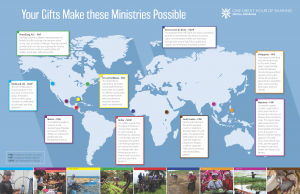Three years ago, the Presbyterian Hunger Program began a recognition program for Hunger Action Congregations who are serving in their communities to lessen the impacts of hunger and poverty. This adds to our long-running recognition of Presbyterian Earth Care Congregations. We have been blessed to learn of servanthood and creativity happening all around the nation: from operating food pantries, hosting community gardens, and supporting the nutritional and education needs of students to advocating for changes in local and national policies to help achieve fair wages, sustainable food systems, environmental justice, and racial justice. We are glad to connect with these congregations and to celebrate the love of Christ they are sharing in their communities and abroad.
Photos thanks to our grant partners:
1st photo: Theresa shows her land agreement. Photo by ARUWE in Uganda
2nd photo by Asociación Fénix in Nicaragua
3rd photo by Improvement and Development for Communities Center in Palestine
4th photo by Little Village Environmental Justice Organization in Chicago, IL
We are also glad to be in partnership with groups around the world who are helping communities to access more and better food, standing with those who are calling for justice, and working towards a more livable environment. Together we address the underlying causes of hunger by standing with people for fair compensation, offering agricultural and leadership training, defending resource rights, responding to environmental crises caused by climate change, and trying to overcome racism, materialism, and other injustices that keep our siblings in the U.S. and around the world from having enough.
Because of your support for PHP, you have a part in this work. Thank you to Nassau Presbyterian Church for ungirding the ministry of the church in its compassionate response to hunger. This year, gifts to One Great Hour of Sharing and to the Hunger Program are supporting work in at least 19 countries and dozens of the United States.
In El Salvador, our Joining Hands network, Asociacion Red Uniendo Manos de El Salvador (ARUMES), is campaigning for the prohibition of agro toxins. According to the Minister of the Environment, 95% of the waters in this nation are contaminated. ARUMES is also seeking to stop the promotion of the sugar cane monoculture, so that farmers will be able to grow basic grains for their families.
Our partner Community Initiative for Sustainable Environment and Gender Development (CISEGD) has been at work in Cameroon for several years. Last year’s project included the construction of a model integrated farm as well as mushroom seeds, piglets, and rabbits. A well was built to supply water for animals, irrigation for vegetable farms, and potable water for about 150 nearby households and the general public. The water component is especially helpful during a time when water is scarce because there are many internally displaced persons due to the anglophone crisis. The model farm offers a place for training and hands-on learning for smallholder farmers. This year, with support from the Hunger Program, CISEGD will offer training in animal husbandry, natural resource management, leadership skills, and gender equity. Animals and mushroom seeds will be provided for 50 program participants. Each farm family who receives an animal will then donate the animal’s first female offspring, along with mushroom seeds, to someone else in need, thus “Passing on the Gift.”
Our partner Ekvn-Yefolecv is a developing ecovillage led by indigenous Maskoke persons on their homelands in rural central Alabama. Key activities include aquaculture, sustainable food production, language revitalization, and living practice of Maskoke culture. At the forefront of the project is a commitment to environmental sustainability. A variety of programs will focus on education, training, and deep holistic health.
This year’s work also includes support for grain banks in Niger, construction of toilets in India, installation of improved stoves in Nicaragua, advocacy for farmworkers and food chain workers in the U.S., land governance training in Uganda, agroforestry plots in Ghana, training in mango tree grafting in Madagascar, resistance to land grabbing in Haiti, agricultural training and response to famine and extreme hunger in South Sudan, and more.
In addition to our typical work, we have been blessed to be able to respond to some emergency food needs resulting from the COVID-19 pandemic. Presbyterian congregations around the nation are continuing to serve in their communities, even while making adjustments to honor state restrictions and keep safety in mind.
These are only a few examples of where your support can make a difference. We are grateful to you – and to God for you, for our partners, and for this work. “For we are what [God] has made us, created in Christ Jesus for good works, which God prepared beforehand to be our way of life.” (Ephesians 2:10 NRSV)
May the grace and kindness of our God continue to work in you, and may you be blessed in God’s care,
Rev. Rebecca Barnes
Coordinator, Presbyterian Hunger Program
www.pcusa.org/hunger





